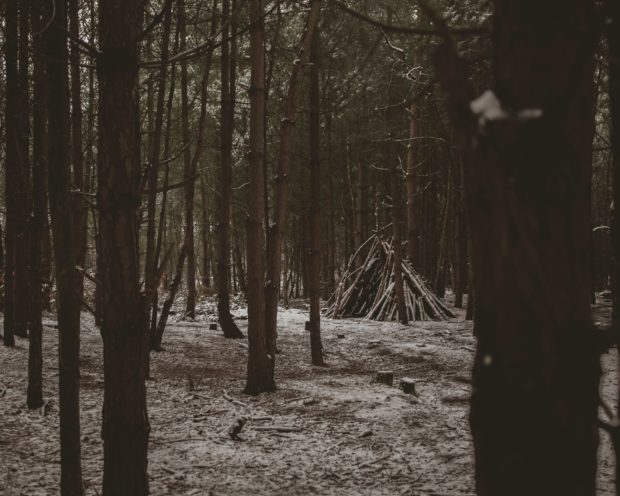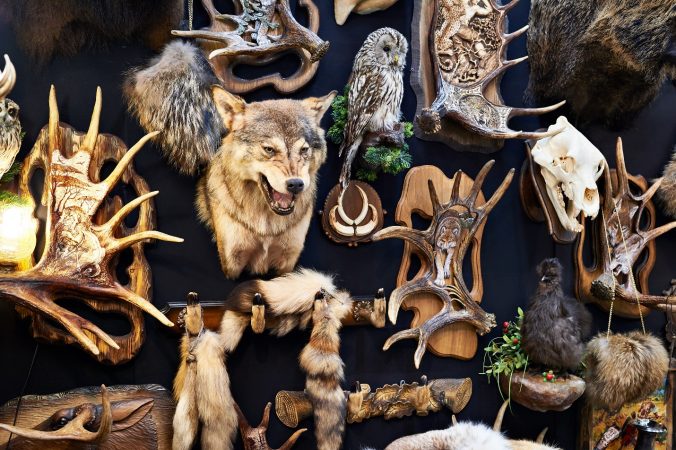You have no items in your cart. Want to get some nice things?
Go shopping
We decided to build the den from all that we could forage from the forest. The one that breathed down the back of our house.
With rucksacks on – a cheese sandwich and a water bottle tucked inside – we trekked up into the trees, taking the path that led us past a frayed rope swing Dad had put up and a ditch that Jenny had once slipped down. It was the first true day of summer; a swelter. Above, metres and metres high, the trees – birch, oak, alder – did little to dull the heat.
“What do we even need for a den?” I asked Jenny.
She fanned her arms out, so we picked at everything in sight. An array of thin sticks, a bundle of snapped and torn branches, various handfuls of foliage to pad the ground. We dragged them into a pile near the rope swing.
“We need more,” she said. Her skin was pulsing a beet red. My back was slick with sweat.
We scoffed our sandwiches, glugged our water and decided to head east, up where the forest bled out into an abandoned quarry. Up where fly-tippers chucked bedframes, fridges, tins of kerosene. Up where we weren’t allowed to go. It was too far from home. Easy to get lost. Or hurt.
“You think Dad is going to come look for us?” I asked.
“He won’t leave Mum,” Jenny said.
East, we went. We hadn’t thought through how we would bring back our findings, should there be any. We hadn’t really though through how to build a den.
Just before the quarry came into sight – the sparse expanse of stone before the inevitable fall of a pit – we stumbled across a sheet of bright blue tarp sticking out of a mound of rubbish; cans of lager and plastic bags. An old bike and some pallets. There was a dead fox in the mound too. Its eyes had been eaten and its body was covered in maggots.
*
Dad was curious. He waited until the end credits rolled on an old Western movie we’d only half been watching before asking—
“What are you girls doing in the forest?”
“Building a den,” we said, in perfect synchronisation. We weren’t twins, but you could be forgiven for thinking we were.
He turned to face us. His eyes were beetle black. Dad spent most days with Mum, and all days thinking about her.
“Why a den?”
There were reasons why we were building a den, not that we knew how to name them.
One was that Mum was ill – what with, we didn’t yet know – and no matter how hard we tried, we couldn’t stop seeing echoes of that illness in every corner of the house; her slowly sallow body that she hid from us in too-big clothes. How Dad sometimes had to carry her up the stairs.
Another reason was that we hungered, however impatiently, for an escape. If the avalanche of her illness was coming – and it was – then at least we had shelter.
But instead of those reasons, we said we were building a den “for fun”, and believed it as strongly as we believed that the earth was round and that the sun rose from east to west.
*
The first den was haphazard at best. Over dinner Dad wanted to know how it was going. We were eight days into our project and complained of the flimsy frame and the way the pieces would never quite hold together. It had collapsed on us twice already.
“You can use some of my tools,” he said. “A hammer and some nails should do it. There’s some old fishing line to tie things together.”
Mum was propped up like a toy in the chair next to Jenny – a Barbie doll holding rigid angles. She was eating slow, pushing the carrots and peas around her plate.
“They can’t do that,” she protested, though it was weak. “They’ll hurt themselves.”
“We’ll be careful, Mum,” my sister said, tucking a strand of curly hair behind her ear. “I promise.”
*
We took up the offer of the hammer and some nails. The fishing line too.
In the spider-ridden garage we watched Dad demonstrate how to use them – “hold the nail here, hammer straight, and this is how to tie a knot.” After his lesson, we lugged everything we needed into the forest and began rebuilding. We wanted to go for something bigger, still triangular, but with enough room to stand.
Though Dad was interested in the den – he even asked if we could draw our plans out for him with felt-tip pens so he could show Mum – he never came up to see what we were working on. He said he wanted to leave us to it. We guessed the real reason was that he couldn’t bear the thought of leaving Mum on her own. She’d gotten worse.
“I still wish he’d come up and see,” I said, making poor work of hammering a nail side-on into a branch and only just missing my thumb.
“What if he goes back and Mum’s dead?” Jenny replied.
*
That summer, Mum was sick during the night. The landing light would come to life and the bright white of the bulb would shine beneath our bedroom door. Together we would lie and listen as she heaved up whatever fragments of food lay in her stomach.
When she was done, and Dad had helped her from her knees, the flush of the toilet would set the pipes aching through the house. In a hushed voice she would say, “I hope I didn’t wake the girls.”
*
There was one rule for the den – now that we’d managed to properly build it – and one rule alone.
1. Only fantasy was allowed to enter.
When we found Dad crying in the spare room, we ran to the den and imagined we were two lone travellers in the very depths of the Amazon, with panama hats upon our heads and venomous snakes at our backs. When the sun was high and the sweat was seeping from Mum so profusely that she mirrored a malady mermaid, we were old friends – lost in the desert and the den was our only escape from the vicious heat.
When Dad told us that Mum may be diagnosed soon, I played the part of Bonnie, whilst Jenny did her best Clyde. We didn’t understand them well, apart from their penchant for crime. We’d seen a film once on a Saturday night – too young to be watching. I can still remember their bodies lying dead in the final scene; Faye Dunaway hanging bloody from the side of the car.
*
On the hottest day of the year – a sweltering 95F – Mum’s illness was diagnosed as cancer. Terminal. Her body was saturated with it. Apparently, they hadn’t been sure quite what it was that was making her ill until then. I couldn’t comprehend how they didn’t know. Couldn’t they just scan her to see what was wrong?
Putting a name to it made nothing easier.
*
Jenny didn’t like to talk about Mum – not in any real sense. I made the mistake of bringing her up as we were playing Go Fish. Outside the den, rain was drizzling. Inside, we were pretending to be in a disgustingly excessive casino in Vegas, betting thousands and thousands on each card.
“What do you think will happen when Mum dies?” I asked. I didn’t quite know whether I meant – does she rot when we bury her? Will we be able to stay in the house? Or – will we be allowed to laugh again? And what happens if I forget how much I love her?
“As long as were in this den, Mum isn’t going to die,” Jenny said. “So, we can’t talk about it.”
“But…”
“Fantasy only, remember.”
*
We were both Indiana Jones the day Dad called us from the forest. Whenever there was bad news – which seemed daily, and unapologetic in its existence – Dad always told us in the confines of the house. He still hadn’t come up to the den. The truth never quite reached us there.
“Girls, I need you to sit down.”
His face was the ash that collected in the bottom of the fireplace – ruins and worn remains. From his mouth the words jumbled. “We think – no, well, I think. No. Erm. The doctor visited, okay. And, well.” He held our hands in his and took a deep, steadying inhale. “Mum might pass away soon, girls. Tonight, and I. No. Yes, I need you – she needs you, to go and see her. Please. Because…”
I wasn’t sure if I knew how to believe him.
*
How do you describe the way your Mum looks before she’s about to die? Do you mention her bird-like body and the way her bones protrude so painfully you’re worried you might break her? Do you write down how she can barely keep her arms up for long enough to hold you and your sister, so your Dad has to physically help her hug you? Do you speak of the fact that she doesn’t appear to be anything like the Mum you know anymore – that she is half that, a third, a tiny percent, and that by seeing her – really seeing her – you know that dying is the best option?
Do you mention it? You don’t. It hurts too much.
*
Later than night, I woke up to find Jenny missing. I wondered if she’d gone to Mum’s room. Or to see Dad. She’d done it before – seeking out private comfort. I asked her about it in the morning. She told me she’d gone to the den.
“What were you doing?”
“Just pretending to be someone.”
“Who?”
I didn’t like the fact she’d gone off without me. She was older by two years and I could already see a future where she would grow out of me – of us – and become a person of her own.
“Mum.”
There’s an old photo of Mum on the landing. Dad had taken it a few days before he asked her to marry him. There are daisies woven into her hair and a white cotton skirt floating around her knees. Perched on her head is her cowboy hat and on her feet are her cowboy boots. The ones she always wore. The ones she’d asked to be buried in.
*
Between Jenny sneaking out and the sun rising, Mum died, passed, moved up and on to heaven.
I remember how her final words – “I love you” – melted on my tongue.
*
The funeral was long. Jenny read a poem that she’d written but could only make it halfway through before Dad had to carry her from the altar and sit her back in the pew.
Everyone wore black except Jenny, Dad and me. He wore a navy suit and a teal tie; handsome and broken, smelling of Old Spice and soap. Jenny and I wore paisley patterned dresses; the material tight and scratchy.
Other words were said about Mum from family I didn’t really know and friends that visited before she became too sick to see anyone. As I listened, I imagined a cavern opening inside me, and in it were all the anecdotes that were said and all the kind recitals that were uttered. Like water from a tap I let the cavern fill up and up until it brimmed, so that on any given day I could peer inside and pick out a tale that told me everything Mum was.
*
In the weeks after Mum died, home became a sphere of paralysis. Together we waited for it to lift – waited as though it was a rug one of us might shake out or a wounded bird that would eventually recover and fly from its perch.
Deliverance didn’t meet us.
Bruised with woe neither he nor Jenny or I knew how to alleviate, Dad cloaked himself in his grief and became lost within it. Once again, the fantasy which upheld our den became a refuge; I’d recently taken up the role of an outlaw, whilst Jenny wore the shiny badge of a Sherriff.
If we were both grieving – which we were – so acutely that at any given moment either of us could have collapsed, we didn’t show it. Not in the den. We saved all our hurt for our now haunted home.
*
Dad was on the sofa, his eyes roaming over letters addressed to Mum – a couple from the bank, some that looked like charities she supported, junk too, when I decided it might be time for him to see what we’d built. It had been two months since Mum died – longer since we’d finished the den.
I told Jenny about my plan as she shoved spoonfuls of cereal into her mouth. She had her Sherriff badge on, a seemingly permanent fixture, I, my outlaw bandana tied loose around my neck.
“Why?” she asked, with her mouth full.
I pictured Dad on the sofa, how empty he was. A pellucid figure. Withdrawn and in need of rescue. I wondered too, in that moment, what he would look like if he slowly melted into the fabric – the witch from The Wizard of Oz?
“He could play pretend for a bit too,” I said.
Jenny shrugged. We shouted for him. He appeared dishevelled in his pyjamas, his hair askew and the letters still clutched in his hands. We told him to get changed, put his shoes and meet us at the entrance to the forest in ten minutes.
“What are we doing?” he asked.
“You’ll see,” we said.
*
His eyes were wide, but his mouth stayed silent. I couldn’t tell if the words were stuck in his throat or he simply didn’t have them. Jenny didn’t wait to find out, instead she laid out the rule as though she were his teacher.
“Only fantasy can enter.” She raised her brow. “Nothing else. You can’t forget.”
I asked him to crouch down. He faltered for a moment before doing so. He couldn’t keep his gaze off the den.
“Jenny is the Sherriff and I’m the outlaw.”
I reached inside my rucksack and pulled out Mum’s cowboy hat. I’d stowed it whilst we waited for him to meet us, tucking it away gently so the sides didn’t bend out of shape. Dad had told us – implored us – to keep it safe.
Like a sword upon a shoulder, ready to swear in a new knight, I sat the hat on his head.
“So, that means you can be the cowboy.”
Jenny held back the old white bedsheet we used as an entrance.
“Ready?”
He dropped his gaze from the den to bore it into the both of us. He stared so long without any reply that I thought we’d spooked him into a stupor.
“Dad?”
I held my breath. Jenny straightened her badge. Together we waited on his answer.
“Yes,” he said, eventually, tipping the edge of the hat, “let’s get going, partner.”

About Emily Harrison
Emily uses writing as an escape from reality and doesn’t drink enough water. She has had work published with X-R-A-Y Literary Magazine, Ellipsis Zine, Barren Magazine, STORGY Magazine, The Molotov Cocktail, Coffin Bell, Retreat West, Nymphs, Tiny Molecules and Gone Lawn to name a few.
- Web |
- More Posts(2)




